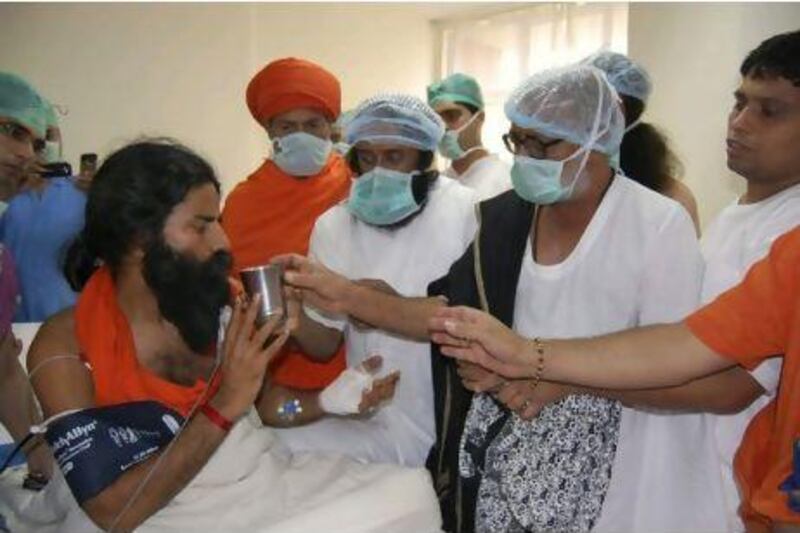DEHRADUN // An Indian yoga guru on hunger strike for the past eight days in protest at government corruption said yesterday he has called off his fast.
However, Baba Ramdev said his fight against corruption would continue, as the high-profile campaign against so-called "black money" - cash from bribes or other illegal transactions held in overseas accounts - had been successful.
The guru's closest aide, Acharya Balakrishna, read a statement on behalf of the bearded, saffron-robed Mr Ramdev in which he said: "I am breaking my fast and all people who are also fasting should also call off their fast. Our unrest against corruption shall continue."
Mr Ramdev, a popular television yoga guru who is also known as Baba Ramdev, began his fast on June 4 in New Delhi.
He and thousands of followers were evicted from India's capital in a police crackdown later that day but he continued his protest at his ashram, or religious retreat, near the Hindu holy city of Haridwar.
He has been under observation at the Himalayan Institute of Medical Science hospital in the northern town of Dehradun since Friday after his condition deteriorated midweek.
The hospital's director, Vijay Dhasmana, confirmed that Mr Ramdev had ended his fast and said he would be discharged soon.
Doctors treating him described his condition as stable, although one neurologist said he was "facing problems in speaking".
Mr Ramdev's high-profile campaign has piled pressure on India's scandal-tainted government.
His protest has raised political temperatures in India, with the prime minister, Manmohan Singh, facing criticism over how the guru was handled by police when he was ejected from Delhi.
The ruling Congress initially courted the guru, sending four cabinet ministers last week to receive him at New Delhi airport but negotiations with him failed to prevent the fast.
The Indian independence leader Mahatma Gandhi used fasts to protest against British colonial rule, but Congress arty spokesman Manish Tewari said modern-day equivalents did not compare.
"The sacred instrument of protest should not be converted into an agent of destabilisation," he told reporters. "Fasts have become a part of the problem rather than a part of solution."
The main opposition Bharatiya Janata Party, which has openly sided with the guru, attacked the Congress party. "The Congress is trying to portray those who are fighting against corruption as enemies of the nation," said party spokesman Rajiv Pratap Rudy.
Corruption has crept up the agenda in India after a string of scandals, notably a telecom licence scam that is thought to have cost the country up to $39 billion (Dh143bn) and has seen a former minister arrested.
Another activist, Anna Hazare, successfully forced the government in April to draft a new anti-corruption law after holding a 98-hour hunger strike in New Delhi.
Subramanian Swamy, president of the opposition Janata Dal, said on Mr Ramdev had made his point.
"Swami Ramdev has achieved his objective and now we welcome this step," the politician told reporters in Dehradun after the guru sipped juice in the presence of Hindu religious leaders in the hospital.
"But his campaign will continue and all those who have stashed 'black money' in secret bank accounts abroad are now rattled," he added.





